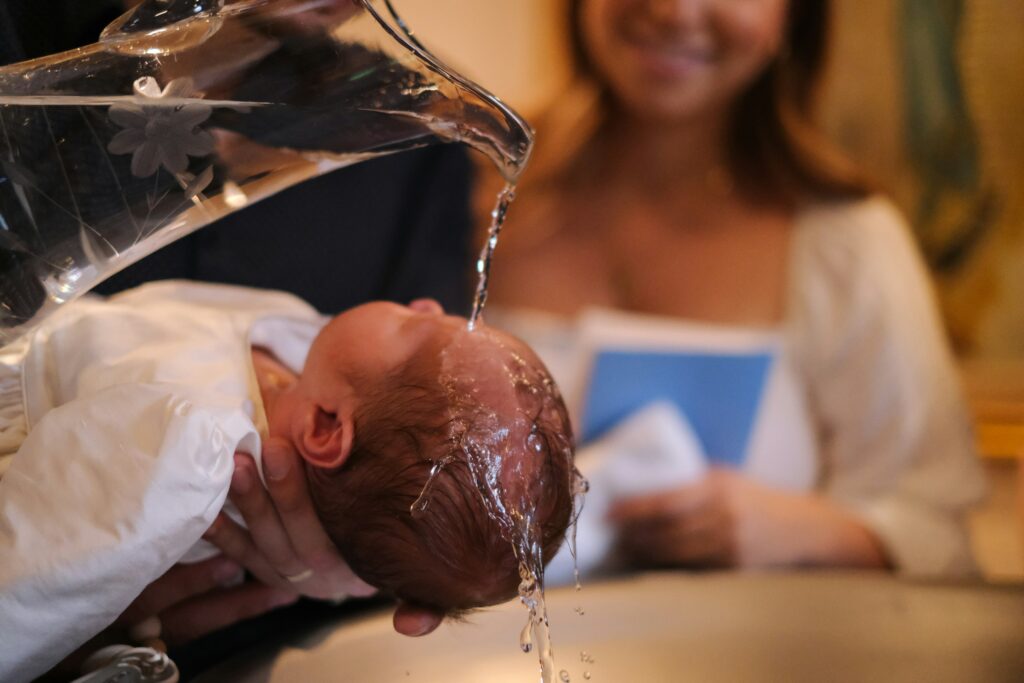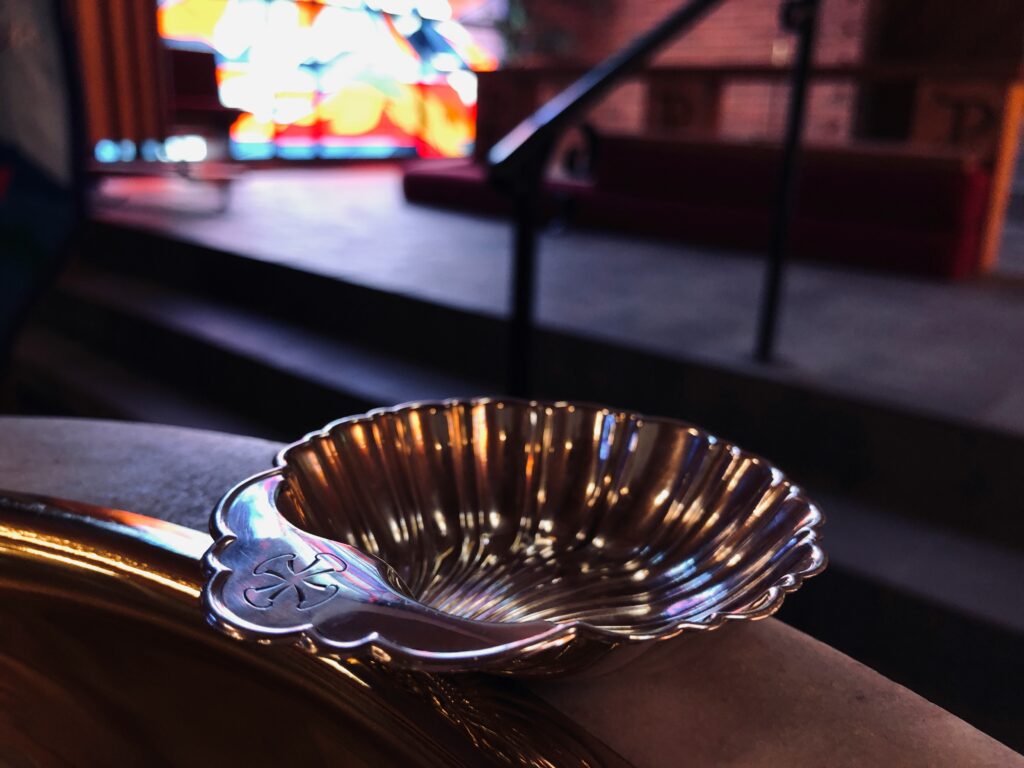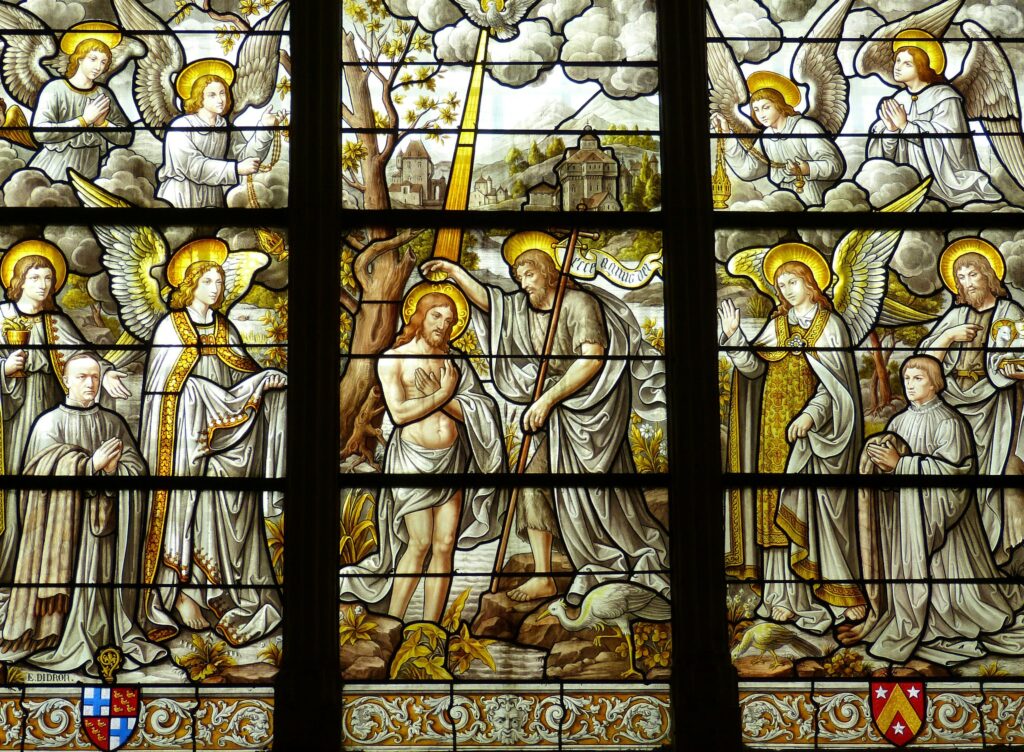What is the Sacrament?
 Baptism is the first of the seven sacraments and the foundation of the entire Christian life. Through Baptism, a person is reborn as a son or daughter of God, becomes a member of the Body of Christ, and is incorporated into the communion of the Church. It is the sacrament by which all sins are forgiven, both original and personal, and by which we are set free from the power of darkness to live in the freedom of God’s children.
Baptism is the first of the seven sacraments and the foundation of the entire Christian life. Through Baptism, a person is reborn as a son or daughter of God, becomes a member of the Body of Christ, and is incorporated into the communion of the Church. It is the sacrament by which all sins are forgiven, both original and personal, and by which we are set free from the power of darkness to live in the freedom of God’s children.
The Catechism of the Catholic Church teaches that Baptism “is the basis of the whole Christian life, the gateway to life in the Spirit” (CCC 1213). The Second Vatican Council describes it as the “sacrament of faith” and the door that opens the way to the other sacraments. The outward sign is simple – the pouring of water or immersion while the words are spoken, “I baptise you in the name of the Father, and of the Son, and of the Holy Spirit.” Yet in that act, something profound takes place: a new creation begins.
The water of Baptism recalls both cleansing and life. In Scripture, water is the sign of God’s creative and saving power – from the waters of creation, to the Red Sea, to the baptism of Jesus in the Jordan. Baptism unites us to Christ’s death and resurrection. We pass symbolically from death to life, from the old self to the new person created in Christ.
What Does it Mean for Us Today?
Baptism is not merely a private or family occasion, though it is often celebrated within the family circle. It is an act of the Church, a public sign of faith, and an entry into a living community of believers. In Baptism, faith and belonging are joined: we are welcomed into the community of the Church and called to share in her mission.
For parents, bringing a child for Baptism is both a moment of thanksgiving and a solemn commitment. It expresses gratitude for the gift of life and the desire that their child should grow in faith, hope, and love. It also involves a promise – to raise their child in the practice of the faith, to teach them to pray, and to guide them towards a personal knowledge of God.
Godparents have an important role. They are not honorary witnesses but active companions in the faith journey of the child. They promise to support the parents, to pray for the child, and to be examples of Christian life.
For adults, Baptism is received after a time of preparation through the Rite of Christian Initiation of Adults (RCIA). This journey includes study, prayer, and participation in the liturgy, and culminates, often at Easter, with the celebration of the sacraments of Baptism, Confirmation, and Eucharist together.
Baptism reminds every member of the Church that faith is not a possession but a gift that calls for growth. Each renewal of baptismal promises – at Easter or during a Baptism – invites us to rediscover what it means to live as followers of Christ in our time.
Preparing to Celebrate the Sacrament
 Families who wish to have a child baptised should make early contact with their local parish office. Baptisms are usually celebrated in the parish church where the family worships. The priest or a member of the parish pastoral team will assist in completing the necessary forms, arranging a suitable date, and offering preparation for the parents and godparents.
Families who wish to have a child baptised should make early contact with their local parish office. Baptisms are usually celebrated in the parish church where the family worships. The priest or a member of the parish pastoral team will assist in completing the necessary forms, arranging a suitable date, and offering preparation for the parents and godparents.
Most parishes hold Baptism preparation meetings, which provide time to reflect on the meaning of the sacrament, the signs and symbols used, and the responsibilities it brings. Parents may be asked to bring the child’s birth certificate, complete a registration form, and provide details of the chosen godparents. At least one godparent must be a baptised and confirmed Catholic who is practising the faith.
If an adult requests Baptism, the preparation follows a longer process through the RCIA. This includes several stages of prayer, catechesis, and discernment, leading to full initiation into the Church at the Easter Vigil.
It is the expectation of the Church that parents, godparents, and candidates approach the sacrament in a spirit of faith, openness, and reverence. Baptism is not a social custom or a family tradition alone; it is a sacred act in which God’s grace is freely given.
The Celebration of the Sacrament
Baptism is normally celebrated on a Sunday, the day of the Lord’s Resurrection, within the community of the parish. The ceremony may take place during Mass or as a separate liturgy.
The rite begins with a welcome at the door of the church, symbolising the entry of the child or adult into the life of the Church. There follows the Liturgy of the Word, in which Scripture is proclaimed and the faith of the Church is professed.
The water of Baptism is blessed, recalling the saving power of God through water in the history of salvation. The priest or deacon then baptises the person with water, invoking the name of the Trinity. The newly baptised is anointed with the sacred Chrism, a sign of sharing in Christ’s priestly, prophetic, and kingly mission.
The white garment, placed upon the baptised person, represents the new dignity received – life in Christ, cleansed from sin. The baptismal candle, lit from the Paschal candle, signifies the light of Christ now present in the person’s life. Parents and godparents are entrusted with the responsibility of helping that light to grow and never to be extinguished.
The celebration concludes with the Our Father and a blessing for all present, sending the newly baptised into the world as a living sign of God’s love.
Living our Baptism
 Baptism is not only the beginning of Christian life but a continual calling. It shapes every aspect of who we are and how we live. To be baptised is to be united with Christ, to share in his death and resurrection, and to take part in the mission of his Church.
Baptism is not only the beginning of Christian life but a continual calling. It shapes every aspect of who we are and how we live. To be baptised is to be united with Christ, to share in his death and resurrection, and to take part in the mission of his Church.
The Catechism teaches that Baptism “seals the Christian with an indelible spiritual mark of belonging to Christ” (CCC 1272). This means that nothing can remove the grace of Baptism, though it must be lived and deepened through prayer, worship, and the sacraments.
Baptism gives us both a dignity and a duty. It calls us to witness to our faith through acts of charity, to participate in the Eucharist, and to seek reconciliation when we fall short. Every time we make the sign of the cross or bless ourselves with holy water, we recall our Baptism and renew our trust in God’s mercy.
The late Pontiff, Pope Francis, reminded us:
“Baptism enables Christ to live in us, and us to live united with Him, to cooperate in the Church, each according to his or her own condition, in the transformation of the world.”
To live our Baptism is to live as disciples – listening to God’s word, serving others, and building up the community of faith. It is the beginning of a journey that leads, through all the joys and struggles of life, towards the fullness of life with God.